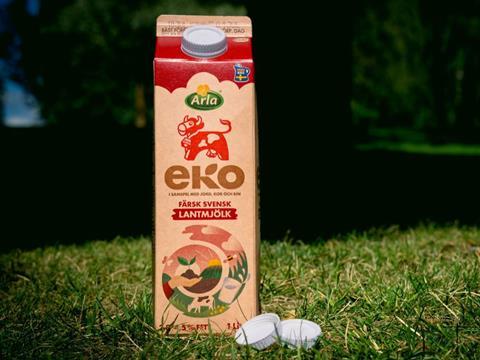
Arla Foods is partnering with Blue Ocean Closures to develop a fibre-based cap for its milk cartons in a bid to cut its plastics consumption by over 500 tonnes a year.
Arla estimates that its standard caps make up for around 23% of the plastic used in its cartons. In what it claims to be an industry first, it will work alongside Blue Ocean Closures to develop a fully functional prototype and complete the testing phase by the beginning of 2024.
Blue Ocean Closures’ fibre-based caps constitute a body made of FSC-certified fibre material and a thin barrier coating. Created using advanced, proprietary vacuum press forming, it is reported that each cap is bio-based, biodegradable in the ocean, and recyclable in existing paper streams.
The solution is hoped to deliver more positive results than a previous trial for capless milk cartons on Arla’s Danish organic range in 2020, with consumers expressing that they found the packaging design inconvenient. At the same time, it aims to contribute towards the company’s goal of eliminating fossil-based virgin plastic in its packaging range by 2030.
“Improving our packaging, including reducing our use of plastic, is imperative to us and we know that consumers are also very invested in this area,” says Peter Giørtz-Carlsen, chief commercial officer at Arla Foods. “This project to explore what could very well be the first fibre-based cap on milk cartons is very exciting and shows that we at Arla are constantly looking to improve and lead the transformation of sustainable packaging.
“We know that consumers like the convenience a cap provides and while we have removed the cap completely from some of our ranges, we acknowledge this need and want to provide a choice for consumers. But if we have to have a cap, we want to create the best possible one and that is what we are doing now.”
“We are delighted to work with Arla, acting as a frontrunner to create a real difference in packaging sustainability,” says Blue Ocean Closures CEO Lars Sandberg. “With increased fibre content, the solution will increase recyclability, starting in Scandinavia and paving the way for global change.”
Christian Zmölnig, director of Corporate Research, Development and Innovation at ALPLA Group – part owner of Blue Ocean Closures – adds: “As part of ALPLA’s important strategic development in the circular economy, we see great potential in this collaboration between Arla and Blue Ocean Closures.”
During the Sustainability Awards 2022, Blue Ocean Closures and Glatfelter were finalists in the ‘Recyclable Packaging’ category for their cellulose-based screw caps. ALPLA Group later made a second investment in Blue Ocean Closures with the aim of accelerating cap development.
This year, the company teamed up with Swed-jam and RISE to replace metal screw lids with fibre lids for jams, smoothies, compotes, and other lidded foods and beverages.
Alongside Stora Enso and AISA, it also debuted what was reportedly the first paperboard tube with a fibre-based closure, said to contain over 85% fibres, at interpack 2023.
If you liked this article, you might also enjoy:
The Lidl approach to packaging sustainability
How did Brazil achieve its 100% aluminium can recycling rate – and can it be replicated in the EU?
Experts have their say on the EU’s Packaging and Packaging Waste Directive revisions
A deep dive into the most important packaging sustainability trends and solutions














No comments yet